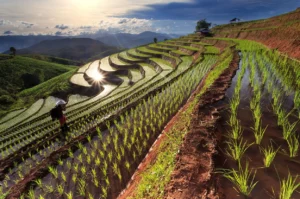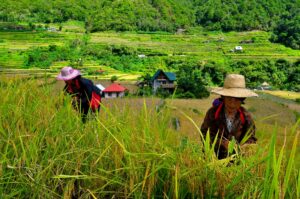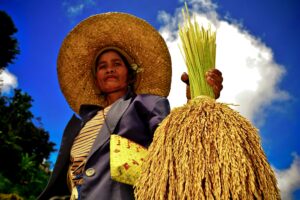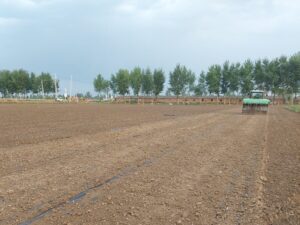Since 1962 (when IRRI began publishing), the Institute has produced some 500 scientific titles encompassing around 100,000 printed pages, in the form of monographs, workshop proceedings, field guides, and manuals. “These books have always been distributed for free or at minimal cost to our partners in the developing countries primarily through their institutional libraries,” says Gene Hettel, head of IRRI’s Communication and Publications Services (CPS). “Many titles are published solely by IRRI; some are copublished with reputable science publishers, such as World Scientific, Elsevier, Wiley, Kluwer, CABI, and others.”
For a time during the 1980s into the 1990s, IRRI was undoubtedly the largest publisher of scientific books in the Philippines, according to Tom Hargrove, CPS head during those days and most recently coordinator of the Information and Communications Unit at the International Center for Soil Fertility and Agricultural Development in Muscle Shoals, Alabama, USA. “We published 18 to 25 books annually back then,” he says. “By 1990, at least 130 editions of 33 books (particularly field guides and manuals) had been published by collaborating publishers in 29 countries and in 42 languages. The linchpin among these, A Farmer’s (42 Primer on Growing Rice languages including 10 Philippine dialects), was easily the world’s most widely published agricultural book.”
A popular field guide in this impressive family of extension-type publications, Friends of the Rice, just had its tenth printing Farmer: Helpful Insects, Spiders, and Pathogens in English in March 2009, thrusting the total number of copies past the 100,000 mark when adding 25 non-English editions in Khmer, Burmese, Vietnamese, Tagalog, Tamil, Nepali, and others.
Although the number of IRRI produced titles has tapered off somewhat in recent years due to declines in scientific staff and budget reductions, the Institute has still produced more than 180 significant monographs, manuals, reports, and proceedings since 1995, including such recent titles as Economic Costs of Drought and Rice Farmers’ Coping Mechanisms, Water Management in Irrigated Rice: Coping with Water Scarcity, Technologies for Improving Rural Livelihoods in Rainfed Systems in South Asia, and Direct Seeding of Rice and Weed Management for the Rice-Wheat System of the Indo-Gangetic Plains.
Mr. Hettel has observed some changes in IRRI’s science publishing scenario since he became CPS head in 1997. “Back then,” he says, “when determining the pressrun for a book, it often exceeded 1,000 copies and we had just started to consider occasionally producing a digital version for placing on a CD or on the Web. Today, we rarely print 1,000 hard copies (because of the now routine digital alternatives) and, while a digital version is a given, we have begun asking the question, ‘Do we need to print any hard copies at all?’”
According to Mr. Hettel, since Jft”>anuary 2008, CPS, with the help of IRRI’s Information Technology Services (ITS), has been posting most of its new books on Google Book. This involves a special Search (GBS) presence for IRRI on the facility even with its own URL: http://books.irri.org. “The new books join nearly 300 historic titles from the Institute’s rich publishing history,” he says. “Envisioning a time when it would be fundamental to have our scientific books—current and historic—available digitally via our own Web site, we began scanning titles in our archives in 2000. This was a slow process because we were scanning at a high resolution (300 dots per inch) and doing optical character recognition (OCR) at 99% accuracy. This process started long before there was a GBS, but just as we finished a critical mass of the project, there GBS was—online and ready for the ‘perfect marriage.’”
According to Erik Hartmann, head of GBS Strategic Partnership Development for Southeast Asia, IRRI’s presence on Google was a collaborative effort in which a “cobranded book search” site was set up. “This basically means using a GBS back-end to provide a custom user-interface for a single publisher, so the search results are restricted to that single publisher’s books and the appearance is designed to match the look and feel of the publisher’s own Web site,” says Mr. Hartmann. “In IRRI’s case, they designed a very beautiful background image and they built a page on their own Web site, which allows users to download book PDFs from their site. This page is dynamic, receiving an ISBN, which is passed from the GBS page and then redirects the user to the appropriate PDF download.”
Mr. Hartmann points out that the IRRI Web team did some really nice extra touches, which he thinks helps make this site so successful. “IRRI made all their copyrighted titles 100% viewable and searchable on GBS rather than the default 20%,” he says. “And, IRRI changed the text of their ‘Buy this Book’ link on GBS to ‘Free PDF download.’ The exciting thing about this change is that the rate at which people click the ‘Buy this Book’ link shot up overnight. Previously, about one in 100 people would click that link, but, after the change, the click-through-rate shot up to more than 10%, which is higher than any publisher we have ever worked with. IRRI was the first publisher on GBS offering PDF downloads of its books and has led the way for other centers in the Consultative Group on International Agricultural Research (CGIAR) to follow suit.”
“We are elated over the public’s response to IRRI books on GBS,” says Mr. Hettel. “Since January 2008 when our books went online at GBS, Google Analytics has recorded more than 200,000 book visits, around 2.5 million page views, and more than 15,000 PDF downloads.”
This collaboration with Google goes hand-in-hand with IRRI’s new copyright policy announced by the Institute’s Board of Trustees after its September 2006 meeting, which, in part, reads, “IRRI will release its information products (software, documents, multimedia, data), as much as possible, under a suitable open content license. Such license shall allow copying, distribution, and (usually) the creation of derivative products; prohibit commercialization; and require attribution, as well as the release of derivative products under the same license as the original product, was released by IRRI, hence, some rights reserved.”









